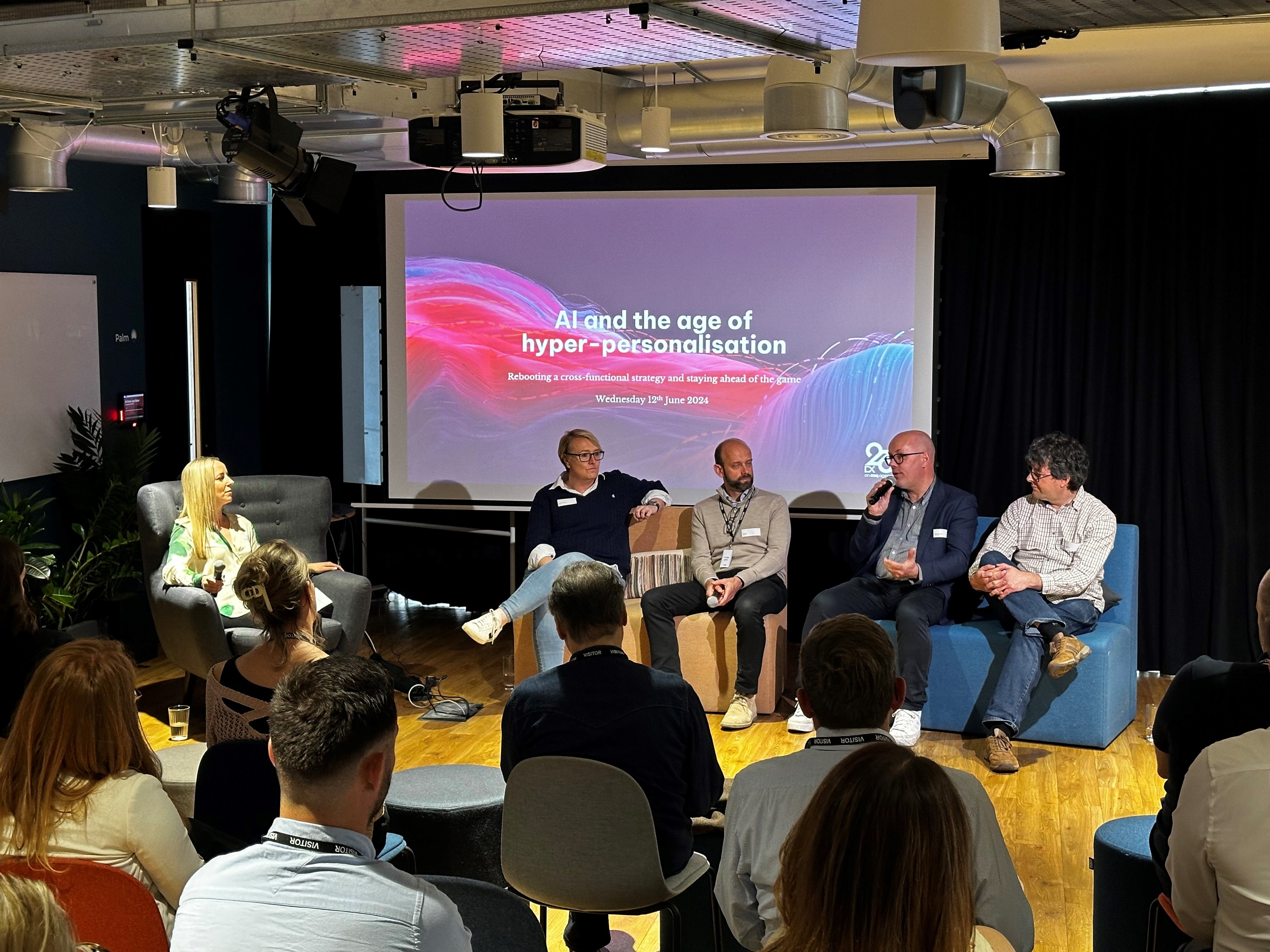AI and the age of hyper-personalisation: key takeaways
On June 12th 2024, we brought together a panel of digital marketing and operations experts to discuss the current state and future potential of artificial intelligence (AI) in marketing. Chaired by 26 DX’s Chief Client Officer, Ellie Foxton-Brown, the panel featured:
- Karla Wentworth, Chief Strategy Officer at img: intermedia global
- Ben Lee, Senior Communications Manager at Bidwells
- Simon Chapman, Senior Director at Optimizely
- John Prior, Solutions Director at 26 DX

The panel explored some of the challenges and opportunities presented by AI in today's competitive landscape. Let’s dive into the key points raised in their discussion.
1. AI is still in the innovation phase
“Maturity means three things. One, what you're doing is repeatable. Two, you've got a defined framework to measure against and defined tools you're using. And three, you're iterating and improving by building on something established.”
26 DX's John Prior emphasised that for most organisations, AI is very much in an innovation space. This means it’s crucial to approach AI initiatives with an innovation mindset – be prepared to experiment, learn, and iterate. Don’t expect immediate perfection or try to benchmark against mature processes just yet.
2. Content creation is a prime opportunity
“The biggest near-term opportunity is in content creation. AI can make us a hell of a lot more efficient, by delivering more with less.”
Ben Lee from Bidwells highlighted that AI helps marketers achieve efficiency gains, when it comes to content creation. By optimising existing processes with AI, marketers can dramatically increase their output without requiring expensive investment. This allows creatives to focus on high-level strategy, rather than spending time on admin and production tasks.
3. Data quality is paramount
“If you've got the best marketing tech stack in the world but poor quality data, you'll go nowhere. It's like having a Ferrari with an empty gas tank.”
All of our panellists stressed the importance of data as a critical foundation for successful AI initiatives. IMG's Karla Wentworth described data as the fuel for your whole marketing engine, including both human and AI elements. Getting the foundations of your data strategy in place is paramount. For example, data quality and integration across key data sources like CRM, automations, customer data platforms and analytics. From here, utilising AI effectively then becomes far easier.
John also noted that AI can assist with getting these basics right too. Machine learning and AI tools can easily spot outliers and anomalies that may otherwise get missed, making them great at interrogating and refining your data supply chain.
4. Risks of AI implementation can be mitigated
"We'd love to use AI, but we're worried about the risks. For example, data governance, security, and not knowing exactly how AI models work or what they're doing with our data."
Organisations in regulated industries, like healthcare and finance, often find themselves up against barriers that slow down their adoption of AI tools. Simon Chapman from Optimizely explained how the 'bring your own model' strategy can derisk AI for them. In this approach, companies build and train AI models on their own data. This addresses concerns about data governance and security, by giving organisations more control over their data and AI outputs.
5. Don’t forget about governance and ethical considerations
“AI implementation is as much a cultural and organisational challenge as it is a technical one. You need clear protocols for what data AI can use, what it can't use, and how you'll protect sensitive information.”
From a regulatory perspective, laws like GDPR, CCPA and now the AI Act in Europe, make clear data governance protocols imperative. John explained that this is particularly relevant when considering what data can be used by AI and how you are protecting sensitive information. He stressed how important explicit customer consent is for building trust, alongside transparency about AI usage. It is crucial to work closely with legal and compliance teams to stress-test data practices. Without strong data protocols, the long-term success of any AI programme can be jeopardised.
6. AI is enabling better personalisation, at scale
“Your creative team focuses on the high-level storytelling, and AI handles the last-mile adaptation. That's a game-changer.”
In a step change from traditional segmentation-based approaches, marketers now have the capability to create individually tailored experiences across all touchpoints.
John from 26 DX outlined some of the ingredients of 1:1 personalisation that AI can help deliver:
- Granular understanding and classifying of content and offerings using AI techniques like natural language processing
- Processing vast amounts of data about individual customers and wider trends
- Real-time orchestration on a per-user basis, matching the right message to the right person, at the right moment
- AI-driven content generation to produce the many variations of copy and creative needed for individual experiences, fed by brand messaging, voice and business rules.
7. Change management is crucial
“Marketing AI is a team sport. There are so many stakeholders involved, from marketing leaders, data scientists and product managers, to agencies and tech vendors. You need to get all those people aligned around a shared vision and roadmap.”
Implementing AI isn't just about technology - it requires a significant cultural shift. Karla emphasised the need for comprehensive change management, including training, communication, and evangelism. It's vital to help team members understand how AI can benefit them in their specific roles and to create a culture of experimentation and continuous learning.
The panel discussion made it clear that AI is set to transform marketing in profound ways. While we're still in the early stages of this revolution, the potential is enormous. By focusing on the right use cases, investing in data foundations, and fostering a culture of innovation, marketing leaders can position their organisations to thrive in this AI-driven future.
As the possible uses of AI in marketing continue to evolve, we are committed to helping our clients navigate this exciting, new landscape. Whether you're taking your first steps into AI, or are looking to enhance an existing AI strategy, reach out to our Solutions team for support.
Our insights
Tap into our latest thinking to discover the newest trends, innovations, and opinions direct from our team.
